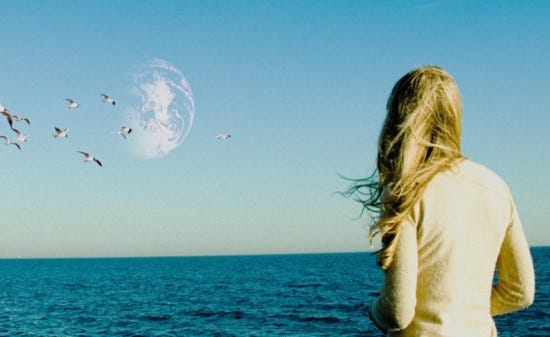Another Earth

The best of the summer releases, "Another Earth" proves that spectacles don't have to be loud to blow audiences away. A refreshing change of direction from bloated epics like "Transformers," it is a quiet, intimate film that uses sci-fi elements to stir its already simmering drama pot.
The mirror planet of Earth in the film is far more than a sci-fi spectacle. It is a symbol of hope and redemption. For Rhoda (co-writer Brit Marling), it embodies a chance for a new life.
Ironically, the planet is also what leads to her despair. Distracted by its first glow in the night sky, she hits a minivan, killing the family inside.
Upon release from prison, Rhoda seeks the widower of the family, composer John Burroughs (William Mapother). Too afraid to apologize, she takes advantage of his post-comatose state and pretends to be a maid offering a trial cleaning service. They become friends — and lovers — all while Rhoda grapples with the guilt weighing heavily upon her. Her greatest hope is that the family she killed is alive on the parallel Earth or, at the very least, that a trip there will give her a fresh start.
Needless to say, this is a harrowing film. However, unlike most films of this typically hyperbolic genre, it is never heavy-handed or self-important. Writer-director Mike Cahill maintains a quiet, subdued tone, conveying sentiments aesthetically and through the understated performances of the cast.
Rather than relying on the kind of philosophical narration evident in similar sci-fi films like "Solaris" and "Gattaca," Cahill employs a subtle visual style to convey the characters’ emotions. Wide shots of the sparse New England setting underscore Rhoda’s sense of isolation and longing. Cahill’s distanced camerawork also helps emphasize her sadness and alienation from her environment. As she opens up and befriends John, the camera moves closer to her.
Marling, whose acting ability is matched only by her beauty, delivers a powerful, deeply felt performance. She often evokes sympathy with her eyes alone, looking as though she is carrying the weight of the world on her shoulders. Mapother carries the same subtle look of pain, as if he is suppressing a devastating secret. Although they are individually effective, the film is firmly anchored by the force of their chemistry together.
Despite her connection with — and yearning for — John, Rhoda is far from the damsel in distress most actresses are condemned to play. She is a strong character fiercely determined to overcome her obstacles. Her brave confession near the end of the film is intense and inspiring.
Halfway through the film, you’ll forget that it is science fiction. Although it is visually dazzling, the ever-hovering planet never distracts from the human drama unfolding in its shadow. A triumph of style and substance, "Another Earth" is not just one of the best sci-fi films in a decade, but one of the best films, period. It is starkly beautiful and tantalizingly alive — like the parallel Earth itself.
Winner of Sundance's Alfred P. Sloan prize and the opening night film at the Indianapolis International Film Festival, "Another Earth" is an indie gem that demands to be seen.


